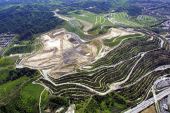 I recently wrote a piece on cellulosic ethanol, fuel created from two-thirds of what we’re currently throwing away, and what many are coming to believe will be the future of energy. In fact the more time one spends thinking about it, the more inevitable it seems that we’ll eventually be mining our own landfills, for cellulose, for plastics and other useful materials, and reusing a lot of what we’ve thrown away.
I recently wrote a piece on cellulosic ethanol, fuel created from two-thirds of what we’re currently throwing away, and what many are coming to believe will be the future of energy. In fact the more time one spends thinking about it, the more inevitable it seems that we’ll eventually be mining our own landfills, for cellulose, for plastics and other useful materials, and reusing a lot of what we’ve thrown away.
The concept of waste has always interested me. My mother lived by an ethic of non-waste. As a child, I had to eat every scrap on my plate or face the consequences, which was interesting to me after a while because I never understood how this was to benefit anyone. How would eating five or six more mouthfuls intend to reduce waste? Wasn’t it just as wasteful to have shoveled it into a body which didn’t need it as to throw it in the trash? Isn’t the entropy of the earth’s great ecosystem the final executor of all organic matter anyway?
And economically there are questions too. If everyone bought twenty percent more food than they actually used, what’s the worst that would happen? More farms, distributors, vendors and supermarkets would be in business, providing more jobs to the populace. More organic matter would make its way back to the landfill, to be mined someday for all manner of usable product. Decomposition would occur and the whole process begin again.
Or there was her argument that hungry kids would be very glad of those leftover bites of my meal, a fact which seemed to me entirely irrelevant unless someone was going to come to our house, scrape my leftovers from my plate and fly them to Africa so that a kid could eat. Even as a child I realized that it would be easier to have Africans grow their own food locally (‘Teach him to fish’). Later in life, I worked out that Western waste in this respect is no indictment at all upon our care for the third world; if they had a capitalist system permitting our level of prosperity, they’d be wasting as much as we are too. In fact, waste is a decent measure of a good economy – my ardent desire is to see third world countries waste as much as the West. Of course the political differences rather than anything else are responsible for hunger and poverty in the third world, not any waste of the West.
It was my mother’s upbringing, by parents who experienced World War II and depression-era life, that was responsible for her ethic of non-waste. When everything is scarce and rationed and short, every last bite becomes sacred. Â In other words, it was the by-product of an unhealthy economy (one impacted by war).
But it’s the sign of a healthy economy that people are free to waste, for the sake of convenience, or for luxury. Order that extra plate of salad. You may want some. But who cares if you don’t eat it? My wife and I own two SUVs: we rarely use all seven seats in our Exporer but it’s useful the odd time we want it. Of course if we suddenly became very tight on money the first thing we’d do is replace the SUVs with highly efficient cars which cost a third of the price to run. As a society, though, in general?
P.J. O’Rourke had this to say:
“We’re told cars are wasteful. Wasteful of what? Oil did a lot of good sitting in the ground for millions of years. We’re told cars should be replaced with mass transportation. But it’s hard to reach the drive through window at McDonald’s from a speeding train. And we’re told cars cause pollution. A hundred years ago city streets were ankle deep in horse excrement. What kind of pollution do you want? Would you rather die of cancer at eighty or typhoid fever at nine?”
Waste. It’s useful, and it’s the sign of a great economy.

